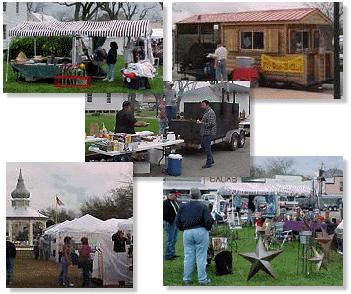Part 1 The History of Flea Market 跳蚤市場的起源
flea market, 字面翻譯過來就是“跳蚤市場”,可是為什么經營舊貨的街頭市場被稱為“跳蚤”場呢?這個名字是怎么來的呢? 有關flea market的來源,有兩種:一種是 flea market 最初來源于紐約的Fly Market,Fly Market是紐約曼哈頓地區的一個固定市場,這個市場從美國獨立戰爭(1775年)之前一直延續到大約1816年。Fly這個詞來源于這個市場的荷蘭語名稱Vly或Vlie,這個詞在荷蘭語的意思是“山谷”,很巧的是,它在荷蘭語中的發音正好和英語中的flea一樣,所以就形成了英語中的flea market。
另一種說法是flea market來自巴黎,是巴黎專門賣便宜貨的地方。人們半開玩笑地說市場內的破爛商品里很可能到處都是跳蚤,該市場因此而得名。不管怎樣,二十世紀二十年代flea market第一次出現在英語中,指的是一種往往在周末舉行的非正式集市。
如今,跳蚤市場已經和跳蚤沒什么關系了,但這個名字卻一直沿用了下來。flea market 一般都是在戶外,那兒有許多攤販出售各種各樣的東西,有不少都是用過的舊東西,新的東西也有,但是質量一般都比較差,價錢也很便宜。只要你眼光夠獨到,你能花很少的錢買到很有價值的古董或其他既便宜又好的東西。正如大家開玩笑所說:“You don't buy what you need, You buy what you want at a flea maket”。
Part 2 How to Bargain 討價還價
Dialogue Script 對話原文
Tom: Hi, how much do you want for this?
Saleslady: 150 RMB.
Tom: What! Don't try to rip me off! I know what this is worth. 50 RMB, tops.
Saleslady: No way! It cost me more than that. (grabs a calculator) 120 RMB.
Tom: Come on! If you don't give me a better price, I won't buy this from you.
Saleslady:110 RMB. Take it or leave it.
Tom: (takes the calculator and enters 55) I'll give you 55 RMB.
Saleslady: I can't do that. I have to make a living. Give me 100 RMB and it's yours.
Tom: That's still much too expensive. (starts to walk away)
Saleslady: Wait, wait! OK, 85 RMB. Final price.
Tom: If that's the lowest you're willing to go, I'm leaving. I'll pay 65 RMB, final offer.
Saleslady: You drive a hard bargain. I'm losing money on this, but alright. I'll let you have it for 65.
Tom: (pays the money) Thanks a lot. See you next time.
Saleslady: Bye.

講解:
1. 這段對話中,Tom在跟賣主討價還價。看看他們都是怎么說的。How much do you want for this? 這件東西你想賣多少錢?這句話一般是買家問的。如果是在可以講價的地方,賣主可能會反問你,“How much do you want to pay for this?”你想出多少錢買這件東西?
2. 開始的時候賣主開價150元錢。Tom覺得太貴了,他說,What! Don't try to rip me off. I know what this is worth. 別想宰我,我是識貨的。買東西的時候最怕的就是被宰。所以不管是不是行家都要先造出聲勢,用這句話鎮住賣家。
3. rip someone off 意思就是某商店或商販要價過高,就是我們平常說的“宰人”,“敲竹杠”。比如說,The man tried to rip me off, but I taught them a good lesson. 那個人要騙我,結果讓我教訓了一頓。如果真的被狠宰了一下,你當然還可以說,“I was ripped off.”或者“I was cleaned out.” 其中,I was cleaned out.有被騙得很慘的意思。
4. Tom說最多能給50塊錢,50 RMB, tops. tops這里是一個復數名詞,在口語中表示“最好的人或事物”,對話中就是指最高的價錢。比如說,I like most cities, but for me Paris is the tops. 一般的城市我都喜歡,但是我最喜歡的城市是巴黎。賣主不同意,No way! 在口語當中也很常用,就像我們常說的“沒門!”。比如說:Give up our ten-minute break? No way! 讓我們放棄10分鐘的工作休息時間?沒門!No way will I go on working for him! 我不會再為他工作了。
5. 那如果想少花點錢怎么說呢?我們可以說Can you give me a little deal on this? 這能賣得便宜一點嗎?或者Can you give me this for cheaper? 能便宜一點給我嗎?還有Is there any discount on bulk purchases?我多買些能打折嗎?bulk purchases 就是“大量地購買”,等于 buy something in bulk。還可以說Give me a discount. 給我打個折吧。 discount 是“折扣”的意思。
6. 大家注意了平時在商店里常出現的表示打折的牌子是 on sale。專門賣廉價物品的商店叫 bargain store,店里賣廉價商品的柜臺叫 bargain counter。 賣主說120塊錢賣給Tom,Tom還是嫌貴,他說,If you don't give me a better price, I won't buy this from you. 如果你不給我便宜點,我就不在你這里買了。
7.一定不要讓賣主覺得你軟弱可欺,那價錢可就講不下來了。賣主想了想,又降到110塊錢,還說Take it or leave it. 買的話就這個價錢,不買的話就走好了,看來這個賣主也不好對付啊。 Tom還是不同意,不過他給賣主加了5塊錢,想55塊錢成交。賣主還是不愿意,她說,給100塊錢就是你的了。雙方都往后退了一步,現在已經到了關鍵時刻了,就看誰能撐到最后了。
8. Tom覺得100塊錢還是太貴,轉身就要走了。That's still much too expensive. much too 是修飾expensive的,本來單用much 或too就可以了,但是這里把這兩個詞連用,更加強調了貴的程度。也可以說That's still way too expensive. 這是 Tom 在跟賣主打心理戰,賣主真的是支撐不住了,招呼他回來,說85塊錢就可以賣。我覺得這一幕很熟悉哦,經常在講不下來的時候轉身就走,如果還可以便宜,賣主自然會叫你回去,如果賣主沒有叫你回去,說明這個東西十有八九就是這個價錢了,這樣你再看到同樣商品的時候,心里就有數了。
9. 一定要貨比三家啊。Tom覺得85塊錢還是貴,If that's the lowest you're willing to go, I'm leaving. 如果85塊錢就是最低價了,我還是不買了。這里go就相當于charge me。還可以用這個表達問最低價錢,What's the lowest you're willing to go? 最低你能出什么價?但是,如果賣者的出價還是太高,你就可以說,“Could you go down a little?”如果你的出價太低,賣者接受不了,他/她也可以相應的說,“Could you go up a little?”但是這里的go卻是pay的意思了。
10. 我們還可以說Come on, give me a break on this. 意思就是“別這樣,你就讓點兒價吧。在不同的語境中,give someone a break這個詞組可以有不同的解釋。“在這句話里,give someone a break 的意思是 give someone a chance,指的是“讓價”。但是如果你正在忙著復習考試,你的室友卻想讓你幫他打水,你就可以對他說,Give me a break. I' m busy right now. 別煩我,我正忙著呢。
11. 賣主到這個時候已經無話可說了,You drive a hard bargain. I'm losing money on this,意思是說“你真會講價,我要賠錢了”。最后賣主決定65塊錢賣給Tom。Tom覺得這個價錢也可以接受了,兩個人就成交了。看來討價還價不光要講技巧,還要講耐力,真是斗智斗勇啊。
Part 3 At a Flea Market 逛跳蚤市場
Dialogue Script 1 對話原文 1
Saleslady: Do you like that vintage clock? It's almost fifty years old.
Martin: Really? It almost looks brand new. And the color designs are so retro.
Saleslady: Well, in the fifties, that clock used to be inside a drive-in burger joint.
Martin: No way! My parents used to hang out at those places.
Saleslady: This is one of my favorite items.
Martin: How did you get it?
Saleslady: I found it at a garage sale once.
Martin: What a find! So, how much does it cost?
Saleslady: Well, because I like you...ninety bucks.
Martin: Ninety dollars is pretty steep. I'll take it for sixty bucks.
Saleslady: Sixty bucks? No-can-do, Son. You'll be lucky if I go down to eighty-five.
Martin: Eighty-five? That's the best you can do? I'll come back later...











